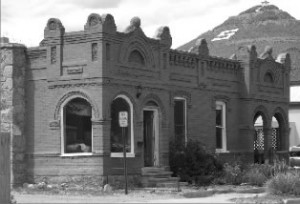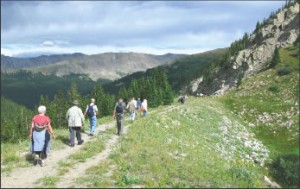Chaffee County attorney requests special prosecutor to investigate 2004 death
SALIDA – A special prosecutor was requested by Chaffee County Attorney Jennifer Davis after 11th Judicial District Attorney Thom LeDoux refused to file charges against two men in connection with the 2004 death of a Highlands Ranch woman at Chalk Creek near Nathrop.
An inquest into the death had been held earlier in May after Chaffee County sheriffs reopened the case and investigated it as a homicide. The results of that inquest had been sealed, but one of the men under investigation, Efran Gallegos, 33, was jailed in Salida on June 5 and released the following day. The whereabouts of the second man, Daniel Mason, 53, who was married to the woman, Nancy Mason, 47 at the time of her death, were not known.
The death was originally determined to be an accident in which the woman apparently fell into Chalk Creek and died during a fishing outing with the two men. Her relatives claimed she was not an avid outdoors person and was fearful of moving water and doubted the story the two men had given.
LeDoux had determined there was insufficient evidence to support a conviction in his decision not to prosecute the two men. Colorado statutes allow anyone to petition the court to order a prosecution. As of this writing a special prosecutor has not yet been chosen.
Nestlé decision delayed again
SALIDA – Deliberations on the Nestlé Waters 1041 special use permit were delayed until July 1 by Chaffee County Commissioners to allow the company more time to pay the county for consultant fees in connection with the application.
Nestlé owed the county more than $122,000 for the fees. A spokesperson for the company claimed the invoice would not get past the corporate chain.
Nestlé Waters wants to begin pumping and shipping water out of Chaffee County to be bottled in Denver and distributed. The issue has sparked fierce debate within the community with most residents apparently against the project.

Colorado grapples with potential water shortage
BRECKENRIDGE – The drought of the early 21st century continues to reverberate in places like Summit County, where the usually placid blue waters of Dillon Reservoir were replaced in 2002 by broad expanses of brown sand and mud.
The skimpy runoff from that drought year, along with subsequent low-snow and unusually hot years left Utah’s Lake Powell, farther down on the Colorado River, no more than a third full. Had the drought continued in its great severity, the reservoir might well have been left with what is called a dead pool, not enough water to be released downstream to Arizona, California and Nevada.
That would have created a ticklish situation. The 1922 Colorado River Compact, which apportions water in the basin among the seven states, requires the four upper-basin states – Colorado, Wyoming, Utah and New Mexico – to deliver 7.5 million acre-feet of water annually based on a 10-year rolling average to the lower basin states.
That figure was derived in error. The framers of the compact assumed more water in the Colorado River than what has actually been the case. Moreover, climate change seems sure to limit flows even more.
In that case, what if there is insufficient water in the upper basin to make that legally mandated commitment to Arizona, Nevada and California and still meet existing needs?
In Colorado, water officials have begun coming up with Plan B and Plan C. One such idea, reports the Summit Daily News, is creation of a “water bank.” This bank would hold water rights senior to the 1922 compact – mostly held now by farms and ranches –to be allocated in such a water-short time to keep the economy going. Two water conservation districts responsible for water matters on Colorado’s Western Slope, where nearly all of Colorado’s ski areas are located, have been putting together the plan.
Such a call would not only impact many ski towns, but also the array of cities located on the Great Plains at the foot of the Rocky Mountains. The Daily News reports that the Colorado River and its tributaries provide between 25 to 75 percent of the total water supplies for those cities, which include Denver and Colorado Springs. – Alan Best
Plea deal accepted in Durgan murder case
CANON CITY – A guilty plea was entered in Fremont District Court for the murder of a man whose body was found in the Arkansas River in July 2008.
Brian Folsom, 30, pleaded guilty to one count of second-degree murder and one count of second degree kidnapping as a crime of violence for his involvement in the kidnapping and killing of James Durgan of Salida. Durgan’s estranged wife, Kristin Durgan, 41, entered a similar plea in April for her role in the crime.
Both will be sentenced July 10. A third accused accomplice, Andrew Tanner, 23, is scheduled for trial Aug. 13. As part of their plea agreements, both Folsom and Kristin Durgan will testify against him.
New neighbors for Westcliffe, San Luis Valley
WESTCLIFFE– In an attempt to escape crowds and high prices back East, Colorado is currently seeing an influx of Amish families to places like the Wet Mountain Valley, Monte Vista and La Jara.
According to the Denver Post, Colorado’s Amish population went from zero to more than 400 between 2002 and 2008. Cheaper farmland and more open space are reasons given for the influx which brings with it horse-drawn carriages and a traditional farming lifestyle.
The Amish trace their roots to the Protestant Reformation in 16th-century Europe. They migrated to North America in the 18th and 19th centuries.
Colorail sues over Denver Union Station
DENVER – Colorado Rail Passenger Association (COLORAIL) is suing the Denver Union Station Project Authority (DUSPA) because they say passengers have been duped. The project was advertised as a transit hub, but COLORAIL alleges it has turned into a real estate development scheme. Ignoring both Colorado Division of Transportation and Denver Regional Council of Governments, the plan is being pushed ahead. Light rail will stop two long blocks from the station out along the joint “coal haul” main line. Tracks which could have been used for train expansion north and south are now gone. Basically, only the one AMTRAK train now existing could be accommodated. Buses are relegated to an underground station that is expensive to operate and is energy inefficient. Only RTD buses will be allowed in, which rules out Greyhound and the new bus service from Colorado Central Country to Denver. COLORAIL alleges that all the main decisions have been made by DUSPA in executive session, thus excluding passengers who might actually use the system. Hopes that AMTRAK passengers could one day board light rail at Union Station and travel to the proposed mountain railroad in Golden appear doomed. COLORAIL is asking for legal expense contributions on their website (www.colorail.org). Bert Melcher, a former RTD board chair, writes on the COLORAIL website that there is so much money behind the redevelopment deal he doubts a little group like COLORAIL can derail it. On the other hand, he thinks the project ignores the National Environmental Policy Act and pins some legal hopes there for future success. – Forrest Whitman

Lamborn wants more oil shale development
DENVER – 5th Dist. Congressman Doug Lamborn has introduced a bill that would reinstate the Bush administration’s midnight oil shale leasing regulations that were reversed by Interior Secretary Ken Salazar early on in the Obama administration.
Lamborn has dubbed the legislation “PIONEER – Protecting Investment in Oil shale the Next generation of Environment, Energy, and Resource security Act)”, H.R. 2540. The act would:
• Direct the Secretary of the Interior to issue additional Research, Development & Demonstration (RD&D) leases within 180 days after enactment of bids published on January 15, 2009. This would reverse Salazar’s decision last February to withdraw a proposed plan for expanded oil shale RD&D leases.
• Make permanent the commercial oil shale regulations, published by the Department last November, and apply them to all commercial leasing for the management of federally owned oil shale.
• Give the Secretary of the Interior the ability to temporarily reduce royalties and fees paid by oil producers in order to further incentivize and encourage energy development.
The bill has been referred to committee.
On a different note, the congressman also introduced a bill, passed in the U. S. House in early June, directing the National Park Service to conduct a feasibility study for inclusion of Camp Hale, the historic World War II training site near Leadville, into the National Park System.
H.R. 2330 calls for a comprehensive review of the feasibility and suitability of adding the site into the system. The camp, on Tennessee Pass, served as a training site for the 10th Mountain Division.
Roadless regs change again
WASHINGTON D.C. – On May 28 the Obama administration said that no new timber-cutting or road project could begin in roadless areas of national forests without the permission of the Secretary of Agriculture, according to the New York Times.
The Clinton administration had initially issued the roadless directive in 2000 but it was overturned by the Bush administration in 2005.
The directive applies to most of the 58.5 million acres of roadless areas cited in the Clinton rule but not to Idaho, which initiated its own procedures for assessing projects under the auspices of a federal statute. Nor does it apply to projects that the Forest Service has already approved.
Under the directive, the Secretary of Agriculture can, in theory, approve logging or road-building in roadless areas but the current directive would ensure any project put forward in a roadless area would have a high degree of scrutiny, said the Times.
No more texting or tweeting on the road
DENVER – As of December 1, Colorado drivers caught texting while driving are committing a crime.
House Bill 1094 was signed into law by Gov. Ritter on June 1 making it illegal to send text messages — including e-mails and tweets — while driving.
The new law also prohibits anyone younger than 18 from using a cellphone while driving.
Violations will be considered a Class A traffic infraction, punishable by a fine of $50 for a first offense and $100 on a second offense.
The final bill was a washed-down version of the originally one intended to completely ban cellphone use on Colorado’s roads and highways, but lawmakers seemed not to have the stomach for that measure. It’s probable they just didn’t want to give up their own driving-while-talking habits.
Habitat Stamps no longer needed
DENVER – New state legislation has changed the Colorado Wildlife Habitat Protection Program resulting in Habitat Stamps no longer being required to enter State Wildlife Areas.
Anyone buying a hunting or fishing license in Colorado is still required to purchase a stamp.
More information on State Wildlife Areas is available online at www.wildlife.state.co.us
Tour of new refuge offered
A guided tour of the new National Wildlife Refuge in the San Luis Valley will be held on July 18. The Baca National Wildlife Refuge is currently open only for pre-arranged guided field trips.
The guided tour, hosted by the Colorado Field Institute, is an introduction to the wide variety of natural resources that exist on the new refuge. Advance registration is required for this field trip. For more information and to register, please call (719) 378-6384 or visit www.coloradofieldinstitute.com
View ARRA funds on webpage
DENVER – The Colorado state government has created a webpage for residents to track almost $3.5 billion in direct funding, benefits and services from the American Recovery and Reinvestment Act. Info is available at: www.colorado.gov/recovery
Notable Quotes:
“I don’t know. I never look at the speedometer.” – Texas resident Warren Horgan after being pulled over in Leadville in his Porsche. He was clocked going about 110 mph on Colo. 91. Leadville Herald-Democrat, May 28, 2009
“Worm-drowning is free this weekend” – Headline in the June 4, 2009 edition of the Wet Mountain Tribune about Colorado’s Free Fishing Day.




